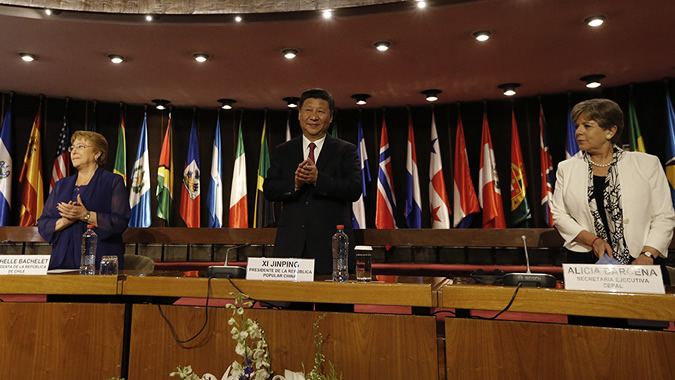China’s President Reaffirms Strategic Partnership with Latin America and the Caribbean in Visit to ECLAC
Work area(s)
Xi Jinping inaugurated the Summit of Leaders from the Media along with Chilean President Michelle Bachelet and ECLAC’s Executive Secretary, Alicia Bárcena.

The President of the People’s Republic of China, Xi Jinping, reaffirmed the comprehensive strategic partnership between his country and Latin America and the Caribbean to foster their people’s development in the current global circumstances, making these remarks during his visit to ECLAC in Santiago, Chile.
At the headquarters of this United Nations regional commission, the Asian country’s most senior authority inaugurated today the Summit of Leaders from the Media, which was attended by more than 100 high-level representatives of the press from 24 countries in Latin America and China. The event will continue through Wednesday, November 23.
The opening ceremony included the special participation of Chilean President Michelle Bachelet and ECLAC Executive Secretary, Alicia Bárcena, among other officials and guests.
“Our shared aspirations unite us, even though we are at a distance. The exchange between media outlets is an important part of the ties between China and Latin America and the Caribbean. The press can do great work to give continuity to and spur on the friendship between both sides,” President Xi Jinping stated.
In that sense, the President presented a proposal in three specific areas to foster the exchange between media outlets: first, to support each other mutually to jointly strengthen their influence in both regions, using new technologies and the Internet to show the reality of China and of Latin America and the Caribbean, clearly explaining their positions on far-reaching issues such as peace and development and the defense of developing countries’ common interests.
Secondly, he proposed bolstering trust to contribute to new progress and objectively explaining the complementary advantages of both sides, while also promoting cooperation models that have an innovative spirit. Finally, the President called for fostering mutual exchange between media outlets, a proposal that included an invitation for more media companies from Latin America and the Caribbean to open offices in China and for a greater number of journalists to study in the Asian country.
The President of China also recognized ECLAC for playing a relevant role in furthering cooperation between China and Latin America and the Caribbean. “I hope that it can continue presenting more results and studies based on cumulative experiences to promote the articulation of our development strategies and continually make new contributions to the advancement of our ties,” he stated.
Meanwhile, the Executive Secretary of ECLAC, Alicia Bárcena, thanked the President for having chosen to visit this organization to share his vision regarding relations between China and our region. “Your presence here reaffirms the visionary proposal that China offers with regard to its friendship with Latin America,” she said upon welcoming the Chinese leader.
Bárcena indicated that the visit by President Xi Jinping allows for rethinking together the traits of globalization and broadening the view of the relationship between both sides. “It is time to build bridges, not walls, to open markets, not close them, to respect differences and build a shared home for the generations to come,” the senior United Nations official stressed.
Previously, in a presentation before the leaders from the media, Alicia Bárcena outlined the main conclusions of the document Economic relations between Latin America and the Caribbean and China: Opportunities and challenges (Spanish only), which ECLAC released today on the occasion of President Xi Jinping’s visit.
The report indicates that trade in goods between Latin America and the Caribbean and China has grown 22 times over since 2000 and reached a historic peak in 2013, marking declines in the following two years. Between 2013 and 2015 the value of the region’s exports fell -23%, which can be explained by the deceleration in China’s growth, which has had repercussions in terms of lower demand and sharp price drops for the commodities that make up the bulk of the regional export basket to that market.
Bárcena added that while China displaced the European Union in 2014 as the region’s second-largest trading partner, the export basket from Latin America and the Caribbean to the Asian giant is much less sophisticated than what is sent to the rest of the world: five products alone represented 69% of the value of regional shipments to China in 2015.
The Executive Secretary of ECLAC emphasized that there are significant opportunities for improving the quality of Latin America and the Caribbean’s global insertion and moving forward with the Cooperation Plan 2015-2019—approved during the First Ministerial Meeting of the China-CELAC Forum, held in Beijing in January 2015—which includes $500 billion dollars in trade and $250 billion dollars of reciprocal Foreign Direct Investment (FDI) stock.
Bárcena indicated that these opportunities entail jointly rethinking globalization to achieve better economic and financial governance, trade multilateralism without protectionism, and greater climate security, peace and stability; establishing innovation as a pillar of development, with the stimulus of science and technology, providing incentives for productive diversification and adding value to exports; promoting an inclusive and sustainable economy, strengthening open regionalism with more trade and investment, with cooperation on matters of energy, natural resources, infrastructure, industry, innovation and connectivity, as well as with the circular economy, accompanied by an environmental big push and low-carbon development; improving the distribution of gains (income and capital); and increasing cooperation and cultural exchange between both sides.
More information:
- Speech by ECLAC’s Executive Secretary, Alicia Bárcena (Spanish only).
- Presentation by ECLAC’s Executive Secretary, Alicia Bárcena (Spanish only).
- Full document: Economic relations between Latin America and the Caribbean and China: Opportunities and challenges (Spanish only).
- Photo gallery of Chinese President Xi Jinping’s visit to ECLAC .
For queries, contact ECLAC’s Public Information Unit.
Email: prensa@cepal.org; Telephone: (56) 22210 2040.
Follow us on: Twitter, Facebook, Flickr, YouTube and Google+.
Related content
Cumbre de líderes de medios de comunicación de China y América Latina y el Caribe
Discurso de la Secretaria Ejecutiva de la CEPAL, Alicia Bárcena, con ocasión de la visita de Xi Jinping, Presidente de la República Popular China.
Cumbre de líderes de medios de comunicación de China y América Latina y el Caribe
Presentación de Alicia Bárcena, Secretaria Ejecutiva de la CEPAL.
Country(ies)
- Latin America and the Caribbean
- China
